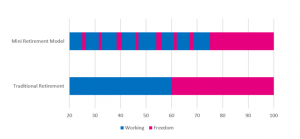Mini-Retirements. A new model for your financial planning?
It’s pretty clear that thinking about retirement doesn’t get many people excited – it can feel especially difficult and uninspiring when you are young and retirement feels so many years away. It’s certainly more tempting to live for today and invest in life experiences instead.
But what if we re-thought the whole idea of retirement and instead of 40 years working, we look at a 40 years freedom model? What if we changed it to something like:
- Work 2 years – take 3 months off;
- Work 3 years – take 6 months off;
- Work five years – take a year off etc

As financial planners we could work with our younger clients to develop a plan which could include a series of mini – retirements once they had established some degree of financial resource to facilitate the freedom periods. That way we can look at it as saving for the future and self supporting later years, whilst also attaining other goals and investing in life experiences.
Mini retirements are more than just a work break or sabbatical – they can be a total release, enabling a complete reset and restart to bring more meaning to our lives.
This path will not be attractive or even possible for some people and worries about older employees returning to work would have to be eliminated, but let’s put it on the table at least and talk to people about the potential.
People who have taken this path often say that they came back from their time off and got a better job than the one they had left. They also say they feel more confident, refreshed and energised, ready to give their best to their next workplace challenge.
Mini-retirements aren’t about asking for 6 months off work, they are about properly retiring/resigning, letting go, spending time out of the work environment and then starting again with renewed purpose and commitment.
Think of a future, where we commit to shorter time-frames with employers and do our best work while we are there. There are all sorts of practicalities to consider both by employers and employees and in some occupations this model will not be appropriate at all. But if we immediately think that this is impossible, it will never get off the ground.
I wouldn’t want to leave Magenta as I love my work, but I can definitely see the benefits of having an intermittent work/freedom model, allowing people to have a purposeful working life for longer while having periods of freedom along the way.

